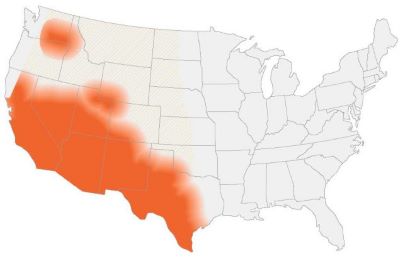The Canine Immune Response to Valley Fever
Valley Fever (coccidioidomycosis) is caused by inhalation of Coccidiodes fungal spores. The fungus is found in desert soil of the southwestern United States and parts of Mexico and Central and South America (see Figure 1). Once inhaled by dogs, humans, or other animals, the spores may be eliminated by the immune system, or they may cause disease locally in the lungs or spread to distant sites throughout the body.

Lung disease is the most common form of Valley Fever in dogs and humans. Clinical signs in dogs include cough, fever, and decreased appetite and energy. Clinical signs of disseminated disease in dogs depend on which organs are infected by the fungus, but can include lameness, swollen joints, fever, weight loss, vision loss, and behavior changes or seizures. Treatment with anti-fungal medications can be successful if started early but must often be given long-term for 6-12 months.
CHF-funded investigators identified an immune response specific to Coccidioides (Valley Fever) infection in dogs. This information will help with disease prognosis, treatment, and prevention.
Currently there is no way to prevent Valley Fever except for complete avoidance of areas where the fungus grows. A vaccine which may prevent or lessen disease severity in dogs is being developed, but more information is needed to understand how the canine immune system responds to this infection. To help bridge this knowledge gap, the AKC Canine Health Foundation (CHF) and its donors provided funding for investigators at the University of Arizona Valley Fever Center for Excellence to study the canine immune response to Valley Fever. (CHF Grant 02408: Predicting the Outcome of Coccidioidomycosis in Naturally Infected Dogs.) Understanding how the immune system reacts to Coccidioides fungal infection will help us better predict clinical outcomes and make treatment recommendations. We may be able to assess how a dog responds to a Valley Fever vaccine once available. Plus, the information may apply to other canine fungal diseases.
CHF-funded investigators measured signaling molecules called cytokines in the blood of naturally infected dogs (with lung or disseminated disease) and compared their concentrations with those in healthy dogs. The testing was completed at the time of diagnosis and after the blood was incubated with Valley Fever antigen. This demonstrated how the immune system was naturally prepared to fight off the fungus, plus how it responded after extensive exposure to this specific disease-causing agent.
Baseline sample testing showed that only two cytokines were increased in dogs with Valley Fever compared to healthy dogs. However, after incubating the blood samples with Valley Fever antigen, numerous cytokine levels increased, demonstrating an immune response specific to Coccidioides infection. Interestingly, there were no significant differences when comparing samples from dogs with lung disease to those with disseminated disease.
With this new information, investigators can now refine their findings by studying how the immune response changes over time following exposure to Valley Fever. They can explore which, if any, of the measurable molecules can be used to predict disease severity, assess response to vaccination, and guide treatment recommendations. The AKC Canine Health Foundation and its donors remain committed to funding important studies like this to help prevent, treat and cure canine disease.
Related Articles
- New Possibilities for Treating Canine Heartworm Disease (10/22/2024)
- The Heart of the Matter: Heartworm Disease in Dogs (04/24/2024)
- Sniffing Out Strategies to Control Chagas Disease (04/18/2023)
Help Future Generations of Dogs
Participate in canine health research by providing samples or by enrolling in a clinical trial. Samples are needed from healthy dogs and dogs affected by specific diseases.



